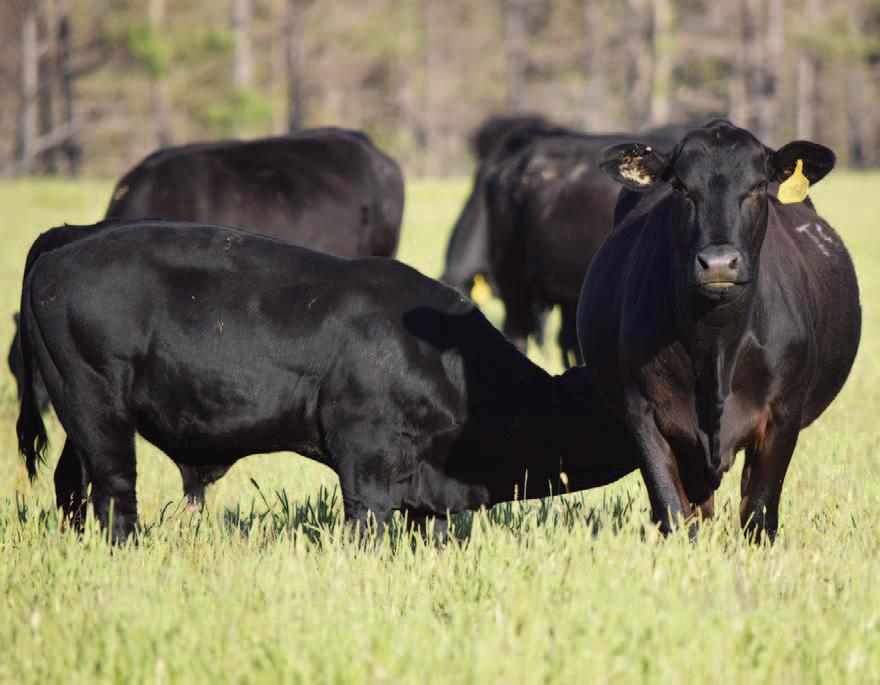Town Creek Farm
The Grit welcomes your inquiries and feedback. The Grit is published by Town Creek Farm, West Point, Mississippi.

Town Creek Farm
Milton Sundbeck, Owner
Office: 32476 Hwy. 50 East West Point, Mississippi 39773-5207

www.TownCreekFarm.com
Joy Reznicek Sundbeck, President (205)399-0221
Joy@TownCreekFarm.com
Cody Glenn, Ranch Manager (601)508-8689
Cody@TownCreekFarm.com
Representatives:
Clint Ladner • (662) 812-8370
Logan Perry • (863)634-4810
Michael Agar • (336)406-4143
South American Representative Ing. Agr. Federico Maisonnave (011) 595 981 362 898
Maisonnave.Federico@gmail.com
The Speed of Trust
BY MILTON O. SUNDBECK
STEPHEN COVEY PUBLISHED HIS BOOK
“THE SPEED OF TRUST” IN 2018 AND IT QUICKLY BECAME A BEST SELLER. I READ THE BOOK BECAUSE OF THE ROLE TRUST PLAYS IN SOUTHERN IONICS, A CHEMICAL COMPANY I STARTED IN 1980.
When Joy asked me to write an article for The Grit it occurred to me that there is probably no other business on earth that relies on trust more than the cattle business in general, and in particular, the seedstock business.

Covey’s mantra is “Nothing is as Fast as the Speed of Trust”. He quotes Jack Welch’s comment about trust, “You know trust when you feel it.” Covey adds, “Simply put, trust means confidence. The opposite of trust; distrust is suspicion.” In his book Covey shows how trust — and the speed at which it is established with customers, employees, and all stakeholders — is the single most critical component of a successful leader and organization.
Trust takes precedence the day a buyer puts down his hard-earned money to purchase a registered Brangus bull or female, knowing he has acquired an asset that will not reveal its true value until two years and beyond. There are no EPDs, pedigrees, DNA, or world-class facilities more valuable than the trust cattlemen have in seedstock producers and their genetics to build and sustain their herds. At the end of the day, trust becomes currency by reducing risk and expenditure of time when sourcing genetics to advance your program.
The trust factor that emanates from Town Creek Farm today goes back to the early nineties when Joe Reznicek and Joy started Cow Creek Ranch. They built customer trust with an eye and understanding of what cattlemen expect from Brangus genetics. They developed the ex-

pertise necessary to produce bulls that could create maternal herds and perform well in southern climates. Joe and Joy also realized that to be successful they had to build a business based on trustworthiness. It began with trustworthy and competent employees. Trustworthy and competent professionals who were experts in their fields – veterinarians, nutritionists, along with suppliers of feed, fertilizer, vaccines, etc. They also recognized what, and who, could not be trusted and made changes when necessary.
Joe and Joy possessed discipline and courage to change a practice or to change people they had put in place but proved to be untrustworthy. We see seedstock producers who get shackled to people, bull development methods and genetics that produce poor results, yet they continue to trust a flawed system and people. It has often been said that the average life of a purebred operation is seven years. Town Creek Farm and Cow Creek Ranch have collectively been in the registered Brangus seedstock business for more than 30 years.
Over the past 30 years, Town Creek Farm has successfully developed a staff that is trustworthy and knowledgeable and developed management systems to the point that we have full confidence in our genetics and seedstock our customers expect and trust. Our genetics are proliferated through a time-tested breeding system. Our “Breeding Up to Brangus” program is managed and propagated through its own vetted systems-based approach.
Experience over time has taught us that in the cattle business distrust travels father than trust.
Since 1993
SUMMER 2023 Volume 11, Issue 2 • Published by Town Creek Farm, West Point, Mississippi • Brangus and Ultrablack JOIN OUR EMAIL LIST TO RECEIVE THE MOST UPDATED SALE INFORMATION AVAILABLE. EMAIL INFO@TOWNCREEKFARM.COM TO JOIN OUR FOLLOWING. FOLLOW US ON FACEBOOK TOTAL COMMITMENT
BULL CALF SIRED BY TCF INTEGRITY 4861F7.
“What Were They Thinking?”
BY JOY REZNICEK SUNDBECK
WE RECEIVED A CALL FROM A CUSTOMER WHO HAD PREGNANCY CHECKED HIS COWS. ALL OF HIS COWS WERE OPEN. HISTORICALLY HE HAD EXPERIENCED HIGH CONCEPTION RATES OVER THE YEARS USING MULTIPLE TOWN CREEK FARM BULLS. Reproductive failure of his cows prompted his vet to recommend testing his bull – for everything. Turns out, the bull passed his semen test with flying colors and tested negative on every disease from Trich to Johnes.
His vet then honed in on the cow herd. Whole herd testing revealed the culprit as Leptospirosis (Lepto). Our customer ultimately divulged that he had not taken the time to give annual cow herd vaccinations.
Another incident recently unfolded. A producer questioned fertility in his Town Creek Farm bulls when too many cows of his cows were open after his fall and spring breeding seasons. The producer contacted me to alert us of the situation. I encouraged him to semen test his bulls. He semen tested both bulls and they passed breeding soundness exams. Following up, I asked if his cowherd was on schedule with annual vaccinations, specifically Lepto. He replied, “Historically, yes.” But admitted that he skipped vaccinating his cows this year. He only vaccinated his heifers.
He went on, “I just had a long in-depth conversation with my vet regarding Lepto.” Our customer presumed he was not at risk for Lepto, even without protection, as he had not purchased or added a single female to his herd in over 20 years.
His vet speculated without annual Lepto protection, Lepto was the only possible disease that could invoke reproductive failure. Reproductive failure is an all-encompassing term meaning cows lose calves during pregnancy or they fail to get pregnant.
“Leptospirosis is endemic everywhere here,” says Dr. Jim Brett of Mississippi State University. “We see it transmitted through rodents, mice and rats, and also wildlife. So, if you have stored feed, and you have rodents, you are at risk of having Lepto.”
“If you skip a vaccine in our environment, you are putting your herd at risk,” cautions Dr. Brett. “It depends on the pathogens in your area on your farm. I’ve seen cattle operations skip a vaccine of clostridial diseases and then lose calves from blackleg.”
Transmission from one infected cow to another healthy cow with Leptospira serovar (Hardjo) is efficient, and the infection rate can be very high in an unvaccinated herd. It is a complicated bacterial disease commonly associated with abortions, stillbirths, premature births, and infertility in cattle.
Lepto is most common in moist climates. It is caused by spiralshaped bacteria (spirochetes) that affect both animals and humans. Often present in wildlife populations, including rats and mice, they survive in surface water, stagnant ponds, streams, or
Techniques Used by Least Cost Producers
Least cost successful cattle producers all have the same techniques, according to Tom Brooks of Vaughn, Montana. “They never short themselves on the money-making aspects of their operation. They never short cattle on animal health. They never short cattle on feed and nutrition. And they never short their operations on genetics,” says Tom. “Because that’s where the money is.”


“Least cost producers may not rebuild a mile of fence this year,” says Tom. “They may wait to rebuild the fence or, maybe, they hold off a year to buy a pickup. Least cost producers are willing to make sacrifices, but not on those things that make them money.”
Tom Brooks is a herd health expert, financial planner, and author. His book, Paid in Full: A Guide to Financial Freedom, is based on the true-life experiences of his Montana family. A recession created challenges that sank their hard-earned cattle ranch under a crippling load of debt. The story tells about their call on faith in God, life changes, hard work and struggles to pay off over $400,000 in debt. The book can be found on Amazon and Barnes and Noble and is available in e-book format.
moist soil for long periods at mild temperatures, according to Shelie Laflin, a Kansas State University DVM.
Dr. Laflin says the pathogen resides in the kidneys of persistently infected animals. “It can be shed in urine and picked up by other animals through mucous membranes. If cow A urinates in a pond and cow B gets her face in the pond, she can potentially pick it up,” she explains. Bacteria can enter a susceptible animal via the nose, mouth, eyes or breaks in watersoaked skin as an animal walks through contaminated water. Fencing off stagnant ponds and swampy areas to reduce cattle exposure to infected urine will significantly reduce transmission of the organism.
“The key is to make sure you are using the right Lepto vaccine at the right time,” says Dr. Brett. He recommends that you vaccinate cows with long duration action vaccines that can carry cows all the way to pre-breeding as Leptospira Serovar Hardjo can cause failure of conception.
“Cows don’t abort because they don’t conceive”, says Dr. Brett. He suggests that you may need to visit with your veterinarian if you are dissatisfied with the reproductive rates in the cowherd or have difficulty getting heifers pregnant
The Leptospirosis fraction of the vaccine is often denoted as “L 5” in the vaccine name, representing Hardjo, Pomona, Grippotyphosa, Canicola and Icterohaemorrhagiae. In addition, several vaccine manufacturers have added extra protection against L. Hardjo type-bovis and this is denoted with “HB” in the vaccine name.
The important thing with any vaccine program for the breeding herd is to establish good immunity in replacement heifers in order to build the foundation for future immunity, says Daniel Grooms, a DVM in Michigan State University’s College of Veterinary Medicine. Lepto vaccines require two initial doses (a booster 4-6 weeks after the first vaccination). “Make sure heifers get both doses prior to breeding to establish that foundation,” Grooms says.

Inflation has hit the cattle businesses hard. Pressures to reduce costs are present. There are legitimate approaches to cutting costs but cutting the wrong costs can be unforgiving. You may get away with it for a while, but it is likely to undermine your success in the long term.
Comments: Herd prevalence studies in North America found that 40%-45% of beef herds are infected with L. Hardjo. “We suspect 50% of herds are infected or have at least one animal carrying L. Hardjo. One study found higher rates of infection in southern vs. northern states. The most obvious difference is climate,” Grooms says.
10 HABITS OF HIGH-RETURN PRODUCERS
1. Below-average annual cow costs 2. Lower than average calf breakeven prices 3. Lower feed costs 4. Lower interest expense (less debt) 5. Lower general operating expense 6. Higher conception rates 7. More pounds weaned per cow exposed 8. High-quality bulls with strong genetics 9. Preventative herd health programs 10. High-quality pasture (maintain nutritional requirements of cows)
Town Creek Farm Celebrates 30 Years
IN 1993, TOWN CREEK FARM FOUNDER AND OWNER, MILTON SUNDBECK PURCHASED THE FIRST 800 ACRES OF FERTILE BLACK BELT LAND EAST OF WEST POINT, MISSISSIPPI. THE RANCH HAS GROWN NEARLY FIVE-FOLD IN ACRES OVER THE PAST THREE DECADES EVOLVING FROM A SMALL STOCKER OPERATION INTO ONE OF THE BEEF INDUSTRY’S MOST RESPECTED BRANGUS SEEDSTOCK GENETIC PROVIDERS IN THE UNITED STATES. THIS YEAR TOWN CREEK FARM CELEBRATES 30 YEARS IN THE CATTLE BUSINESS.
In 1914, Sundbeck’s grandfather emigrated from Sweden and settled east of Austin, Texas, and started a dairy farm. As a youngster, Sundbeck worked on the family dairy farm as well as on the cattle ranches of his grandfather Lynn White who raised Horned Herefords on the Brazos River near Clifton, Texas, and on his uncle’s ranches in central Texas.

“I was raised in farming and ranching country and dreamed of owning land one day,” says Sundbeck. “I spent so much time outdoors that I developed a love affair with the land.”
Sundbeck entered the chemical business when he was hired by Hercules, Inc. and later joined American Cyanamid in Mobile, Alabama. In 1980, Sundbeck started his own chemical company, Southern Ionics, Inc. and came to West Point, Mississippi where he built a manufacturing plant to produce and market chemical products for use in paper making and in Portland cement manufacturing. Southern Ionics Inc. has 11 manufacturing plants in the U.S. and 325 employees.

In 2005, Sundbeck purchased his first registered herd of Brangus and Ultrablack cows from Cow Creek Ranch in Alabama. Town Creek Farm hosted its first public offering of bulls at the ranch in 2013.
Throughout its history, Town Creek Farm has shown a commitment to excellence, making it the driving force behind its purpose. “As I look back over 30 years, it has been day by day,” says Sundbeck. “A new page in the book is turned every single day. Then, it’s the milestones along the way.”
“A lot has changed in 30 years. Our long-term genetic commitment to the Brangus breed is the most profound,” says Sundbeck. “Customers come back to our program because we offer consistent, honest, and innovative genetics. This, along with the smart, passionate people on our team, is what separates us from the crowd and makes us the best in the business."
Sundbeck and his team extend their thanks to all of those that have supported Town Creek Farm and challenged us to be premier breeders of Brangus genetics.

Town Creek Farm continues to stay focused on its mission. Its success is evident in the company's significant milestones over the decades, including:
30 YEAR HIGHLIGHTS
• Initiated and collaborated with Neogen and the University of Florida to develop Igenity Indicus, a DNA product to identify the percent Bos indicus in cattle. Reporting the percent Bos taurus vs. Bos indicus influence in an animal, Igenity Indicus is a first-of-its-kind genomic tool for indicus influenced cattle. Totaling to 100%, the results can be used to help commercial producers select replacement heifers to maintain the appropriate breed makeup for their environment.
• Introduced and trademarked VigorMax™ cattle that offer more Bos indicus influence for customers searching for maximum heterosis and heat tolerance. VigorMax™ cattle are ½ Brahman x ½ Angus.
• Implemented whole-herd annual testing for Johnes disease since 2006. Town Creek Farm utilizes both the “blood” ELISA and “fecal” DNA tests on all cows at weaning, all herd sires and dams of bulls owned by our Bull Production Partners. Cows that test positive are removed from the herd to ensure absolute eradication and to guarantee Town Creek Farm bulls are Johnes-free.
• Town Creek Farm conducts bi-annual Anaplasmosis and Leukosis surveillance testing. Surveillance testing is a proactive method to detect the prevalence of diseases in our cowherd. Anaplasmosis is common in sub-tropical regions of the country and can be spread with contaminated needles, blood and ticks.
• In 2019, Town Creek Farm initiated an in-herd cow scoring system of breed character, hoof angle, claw set, teat and udder composition, productivity, body condition and hair shedding. The ultimate purpose is to accumulate sufficient data to track traits relative to pedigrees and cow families.
• Established a program of developing new first generation lines of 3/85/8 Brangus genetics through breeding up from foundation stock of Brahman and Angus in 2015. Town Creek Farm recognized that few, new lines of Brangus cattle existed in the current Brangus population and saw its importance to the long-term viability of the Brangus breed. In this project, we have taken a mathematical approach by working with large groups of percentage cattle and utilizing in vitro fertilization (IVF) to reach our goal. New lines of Brangus offer customers higher levels of retained heterosis, heat tolerance, and longevity.

• Produces In-Herd Selection Indexes through an in-herd analysis of the bull sale offering based on adjusted phenotypic data to provide customers with a comparison of bull offering. These numbers represent a validation of the individual animal rankings of the Town Creek Farm bull offering. Ranking is from 0 (lowest) to 1.0 (highest). Indexes consist of Calving Ease, Growth, Fertility and Carcass.
• Exported a live Town Creek Farm bull to the country of Thailand and semen and embryos to countries of South Africa, Paraguay, Brazil, and Australia.
• Established and funded an endowment for a professorship at Mississippi State University College of Agriculture and Life Sciences to advance beef cattle production in Mississippi and in the Southeast.

• Established and funded an endowment for a professorship at Mississippi State University College of Agriculture and Life Sciences to advance beef cattle production in Mississippi and in the Southeast
• On-going funding of the Mississippi State University (MSU) Equestrian Team and support staff. The MSU Equestrian Team is a competitive horseback riding team participating within the Intercollegiate Horse Show Association which encompasses over 400 member colleges and universities with a total of 10,000 members. Riders compete in either the English or Western discipline.
• Town Creek Farm’s commitment and progressive approach to the seedstock business led to being named a finalist for the 2020 Beef Improvement Federation (BIF) Seedstock Producer of the Year Award.
MILTON SUNDBECK ON HORSEBACK (ABOVE) AND ATOP FRESH BALED HAY WITH HIS MOTHER AS A YOUNGSTER.
TOWN CREEK FARM WAS A 2020 BIF SEEDSTOCK PRODUCER OF THE YEAR FINALIST.
OUT WORK• OUT LAST
Makes bull buying more affordable. Discover the Difference.
Town Creek Farm bulls hold up, out-work, out-last and out-perform their peers. Fewer bulls to replace. More pounds sired over a longer period of time. Full two-year-old bulls sell.
Town Creek Farm Sale
Saturday, October 21, 2023 • 12 noon at the ranch near West Point, Mississippi

150 Brangus, VigorMax™ Half-Blood Bulls, and Ultrablack & Plus First Gen Brangus Bulls

250 Commercial Brangus Bred Heifers
30th Anniversary
Town Creek Farm Hosts Collegiate Judging Teams Workouts
Town Creek Farm was glad to host practice workouts for collegiate livestock judging teams as they prepared for national competitions. Teams from the University of Tennessee, Northeastern Oklahoma A&M College and Northeast Mississippi Community College were received by Town Creek Farm.
Collegiate livestock judging provides students interested in the livestock industry the opportunity to develop life skills for their futures and careers. Through the training process, called workouts, students develop technical phenotype appraisal skills. They refine thought processes through the assimilation of concepts.
An important component of Livestock Judging competition is the delivery of oral reasons. Students are asked to describe their thought processes in ranking the livestock and defend their decisions in a structured, logical and professional manner.

Hampton Inn & Suites (662)494-7802 5821 Hwy. 45 Alt. South West Point, Mississippi 39773 Ask for Town Creek Farm block Hyatt Place Columbus (662)370-1800 101 Hospital Drive Columbus, Mississippi 39705 Ask for Town Creek Farm block HOTEL ACCOMMODATIONS
THE UNIVERSITY OF TENNESSEE - UT LIVESTOCK JUDGING TEAM, COACHED BY TAYLOR LANGFORD, HONED THEIR SKILLS IN BRANGUS BULL CLASSES. THE TEAM WENT ON TO WIN RESERVE CHAMPION TEAM HONORS AT THE DIXIE NATIONAL LIVESTOCK JUDGING CONTEST.
COACH JENNIFER BEDWELL BROUGHT HER NEO A&M LIVESTOCK JUDGING (NORTHEASTERN OKLAHOMA A&M COLLEGE) TEAM TO THE RANCH TO EVALUATED WORKOUT CLASSES OF BRANGUS BULLS – NEARLY 30 STUDENTS STRONG. NEO HAS A LONGSTANDING REPUTATION FOR RECRUITING SOME OF THE BRIGHTEST AND MOST TALENTED YOUNG STUDENTS IN THE LIVESTOCK INDUSTRY.
This first generation Brangus sells plus many more first gens!
He Sells!
He Sells!













